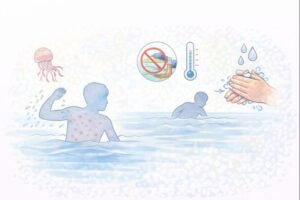Open Water Swimming in Canada: Hazards & Safety Tips for Lakes, Rivers & Oceans
Many Canadians enjoy swimming in lakes, rivers, and oceans. Open-water swimming is exciting and refreshing, but natural waterways can introduce risks that indoor pools do not. With proper safety awareness, most risks can be reduced.
Jellyfish Stings (Saltwater)

-
sharp stinging discomfort
-
redness or rash
-
localized itchiness
Prevention & First Aid
-
Avoid posted jellyfish zones
-
Remove lingering tentacles using tweezers or the edge of a card (avoid bare hands)
-
Apply a cold pack wrapped in cloth to reduce discomfort
Seek medical attention if symptoms worsen, spread, or cause breathing difficulty (rare).
Sewage & Contaminated Seawater
Swimming in water contaminated with sewage can lead to:
-
digestive upset
-
respiratory irritation
-
throat, nose, or ear infections
Check water-quality advisories before swimming, especially after storms or heavy rainfall.
Cold Water & Hypothermia Risk
Many Canadian waterways stay cold even during summer. Cold water can drain body heat quickly, making arms and legs weak and swimming more difficult.
Safety considerations:
-
Enter gradually — do not jump into cold water
-
Swim near shore
-
Use a wetsuit in colder conditions
-
Bring warm clothing for after-swim rewarming
-
Know the early signs of hypothermia: shivering and chattering teeth
Exit the water immediately if these symptoms develop and warm up promptly.
Stomach Upset from Freshwater Lakes & Rivers
Some individuals experience diarrhea or vomiting after swimming in lakes, rivers, or streams contaminated with animal droppings or sewage. Pathogens like Cryptosporidium and E. coli may be present.
Prevention tips:
-
Do not drink untreated stream or lake water
-
Avoid swallowing water while swimming
-
Wash hands after wading or handling wet shoreline surfaces
Swimmer’s Itch (Freshwater)
Swimmer’s itch is an itchy rash caused by tiny parasites that live in snails present in shallow marshy lakes and ponds. Rash usually appears shortly after swimming and lasts a few days.
Key points:
-
Not contagious
-
Generally mild
-
Treatment is rarely needed
-
Reduced risk by rinsing off after swimming and avoiding stagnant, reed-filled shallows
First Aid & Water Safety Training in Canada
Open-water safety benefits from strong first aid awareness. Recognizing dehydration, hypothermia, or allergic reactions supports safer recreation. St. Mark James Training offers first aid and CPR/AED certification — valuable in aquatic environments where emergencies such as near-drowning or cold exposure can occur. Water safety literacy benefits families, employers, camps, and outdoor recreation groups across Canada.
Educational Disclaimer
This article provides public education for Canadians and does not replace professional medical advice. Seek care for concerning symptoms or suspected waterborne illness. Follow local water-quality and safety advisories.
